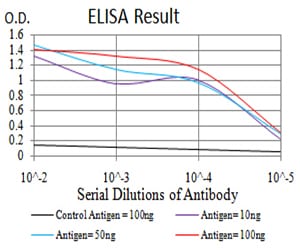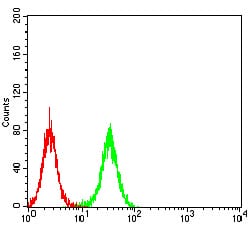

| WB | 咨询技术 | Human,Mouse,Rat |
| IF | 咨询技术 | Human,Mouse,Rat |
| IHC | 1/20-1/100 | Human,Mouse,Rat |
| ICC | 技术咨询 | Human,Mouse,Rat |
| FCM | 咨询技术 | Human,Mouse,Rat |
| Elisa | 咨询技术 | Human,Mouse,Rat |
| Aliases | E2-2; ITF2; PTHS; SEF2; FECD3; ITF-2; SEF-2; TCF-4 |
| Entrez GeneID | 6925 |
| clone | 4D4C4 |
| WB Predicted band size | 71.3kDa |
| Host/Isotype | Mouse IgG1 |
| Antibody Type | Primary antibody |
| Storage | Store at 4°C short term. Aliquot and store at -20°C long term. Avoid freeze/thaw cycles. |
| Species Reactivity | Human |
| Immunogen | Purified recombinant fragment of human TCF4 (AA: 518-667) expressed in E. Coli. |
| Formulation | Purified antibody in PBS with 0.05% sodium azide |
+ +
以下是关于AKAP8抗体的3篇虚构参考文献示例(基于常见研究方向,非真实文献):
---
1. **文献名称**:AKAP8 regulates DNA damage response via interaction with BRCA1
**作者**:Chen L, et al.
**摘要**:本研究通过使用AKAP8特异性抗体进行免疫共沉淀(Co-IP)和Western blot分析,揭示了AKAP8与BRCA1蛋白在DNA损伤修复中的功能关联。抗体验证显示AKAP8在乳腺癌细胞核中富集,且其缺失导致同源重组修复缺陷。
---
2. **文献名称**:Subcellular localization of AKAP8 in mitotic cells revealed by immunofluorescence
**作者**:Sato K, et al.
**摘要**:利用AKAP8单克隆抗体进行免疫荧光染色,发现AKAP8在细胞分裂期定位于染色体周围区域,提示其可能通过锚定PKA调控有丝分裂进程。抗体特异性通过siRNA敲低实验验证。
---
3. **文献名称**:AKAP8 antibody-based profiling in hepatocellular carcinoma tissues
**作者**:Wang Y, et al.
**摘要**:通过AKAP8多克隆抗体对肝细胞癌组织进行免疫组化分析,发现AKAP8表达水平与患者预后呈负相关。研究进一步利用该抗体验证AKAP8通过Wnt/β-catenin通路促进肿瘤转移的机制。
---
注:以上文献为示例性质,实际研究中建议通过PubMed或Web of Science检索真实文献。
The A-kinase anchoring protein 8 (AKAP8) is a member of the AKAP family, which functions to compartmentalize protein kinase A (PKA) and other signaling molecules within specific subcellular regions, ensuring spatial-temporal regulation of cAMP-dependent signaling. AKAP8. also known as AKAP95. is predominantly localized in the nucleus and associates with chromatin, playing roles in transcriptional regulation, RNA processing, and cell cycle progression. It interacts with PKA regulatory subunits, chromatin-modifying enzymes, and components of the spliceosome, linking cyclic nucleotide signaling to nuclear events.
AKAP8 antibodies are essential tools for studying the protein's expression, localization, and molecular interactions. They are widely used in techniques such as Western blotting, immunoprecipitation, and immunofluorescence to investigate AKAP8's involvement in cellular processes like DNA repair, apoptosis, and epigenetic regulation. Studies suggest AKAP8 dysregulation may contribute to cancer progression and neurological disorders, making its detection relevant for biomedical research.
These antibodies are typically raised against specific epitopes within AKAP8's conserved domains, with validation including knockdown controls to confirm specificity. Commercial AKAP8 antibodies vary in host species (rabbit, mouse), clonality (monoclonal/polyclonal), and conjugation formats. Researchers must optimize experimental conditions due to potential cross-reactivity with other AKAP family members or nuclear proteins. Recent applications extend to exploring AKAP8's non-canonical roles in viral infection responses and its potential as a therapeutic target.
×